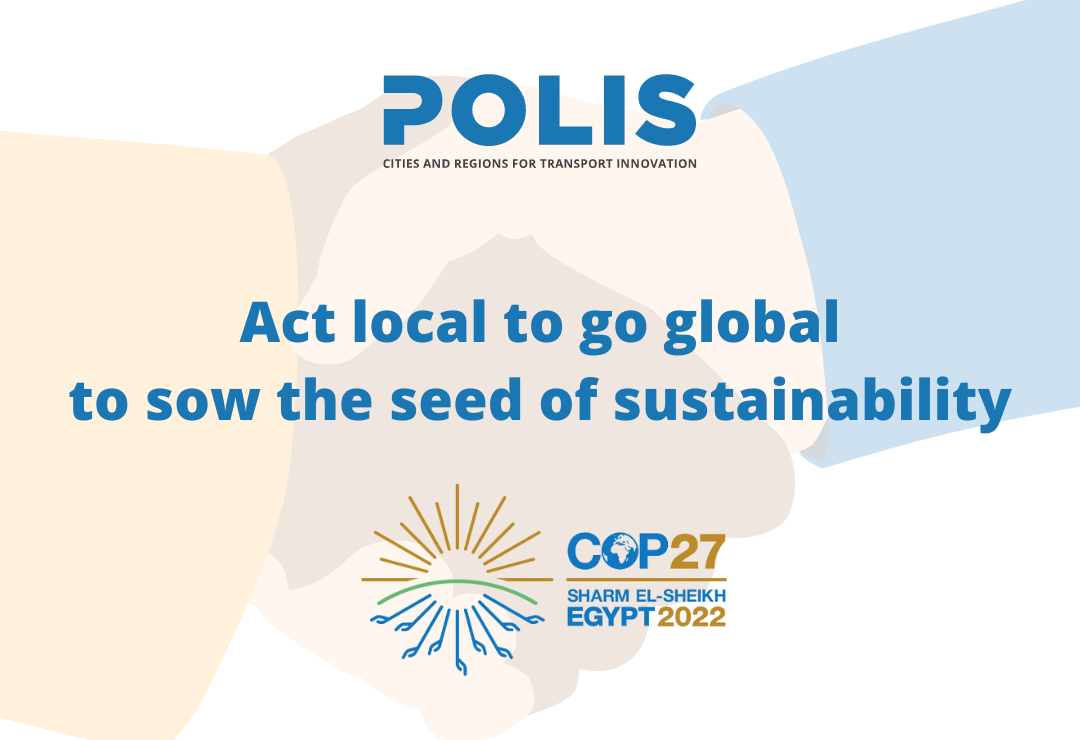POLIS calls on COP27 to take decisive action and listen to cities
POLIS has penned a letter to the 27th Conference of the Parties of the UNFCCC, COP27, calling for international leaders to take decisive and concrete action at this year’s summit, warning that targets will not be achieved without bringing the voices of local decision-makers to the fore.
The letter comes ahead of World Cities Day, celebrated annually on 31 October, when we reflect on the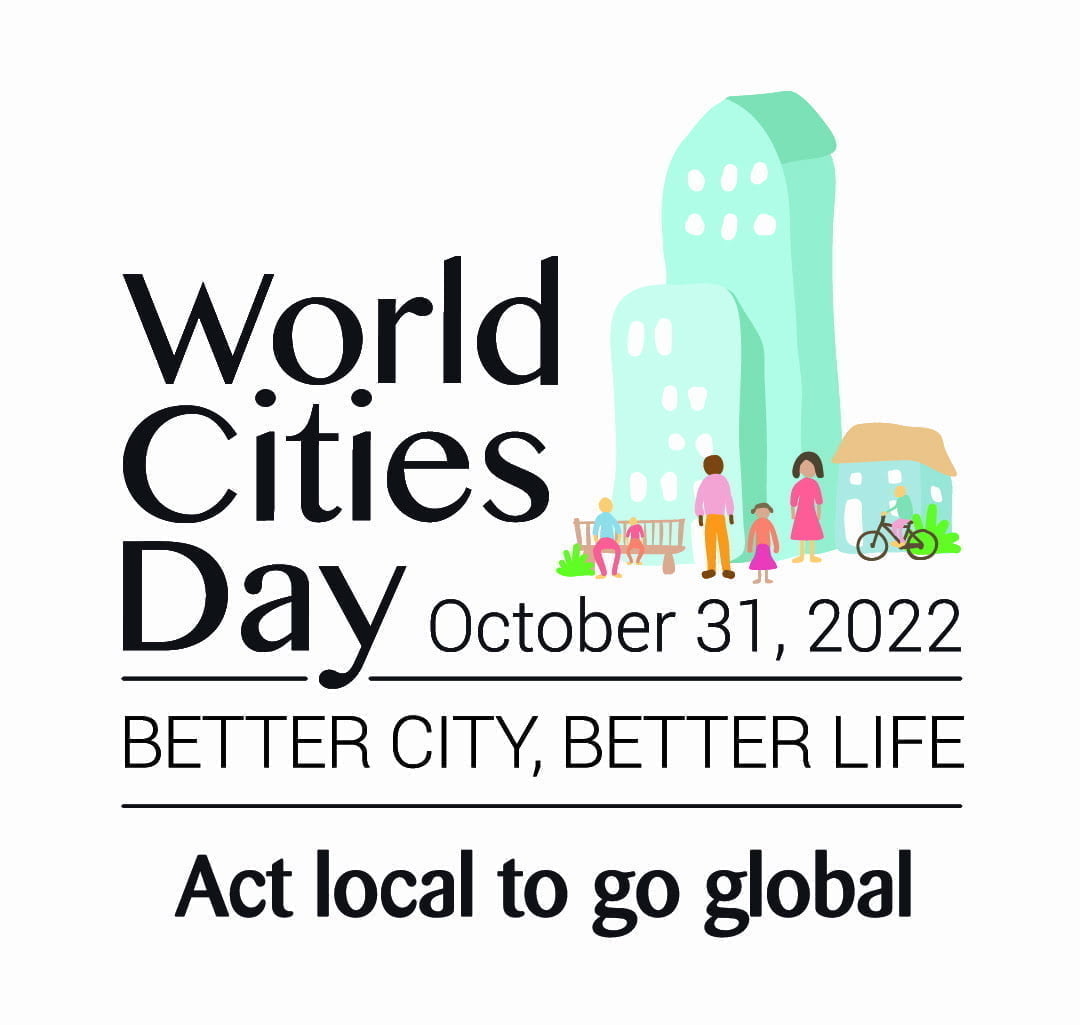 instrumental role our cities play in tackling our climate crisis.
instrumental role our cities play in tackling our climate crisis.
This year’s World Cities Day theme, ‘Act local to go global’, is at the core of POLIS’ philosophy, as we bring together cities and regions to share mobility challenges, solutions at hand or under development, and aspirations for the future.
World Cities Day is a moment to celebrate our sustainable transport achievements, but also reflect on how far we have yet to travel, and how little time we have left to get there.
 This is why POLIS is seizing World Cities Day as an opportunity to call on international leaders at the upcoming COP27 to give our cities and regions a seat at the table- helping to steer Europe — and indeed the world — toward a cleaner, more resilient, and more equitable future.
This is why POLIS is seizing World Cities Day as an opportunity to call on international leaders at the upcoming COP27 to give our cities and regions a seat at the table- helping to steer Europe — and indeed the world — toward a cleaner, more resilient, and more equitable future.
As the UN itself recognises, local action is critical to achieving sustainable development goals by 2030.
Cities are on the front line of the fight against climate change, but they cannot do it alone and they urgently need support from national and international decision-makers. Working as a global coalition has never been so urgent.
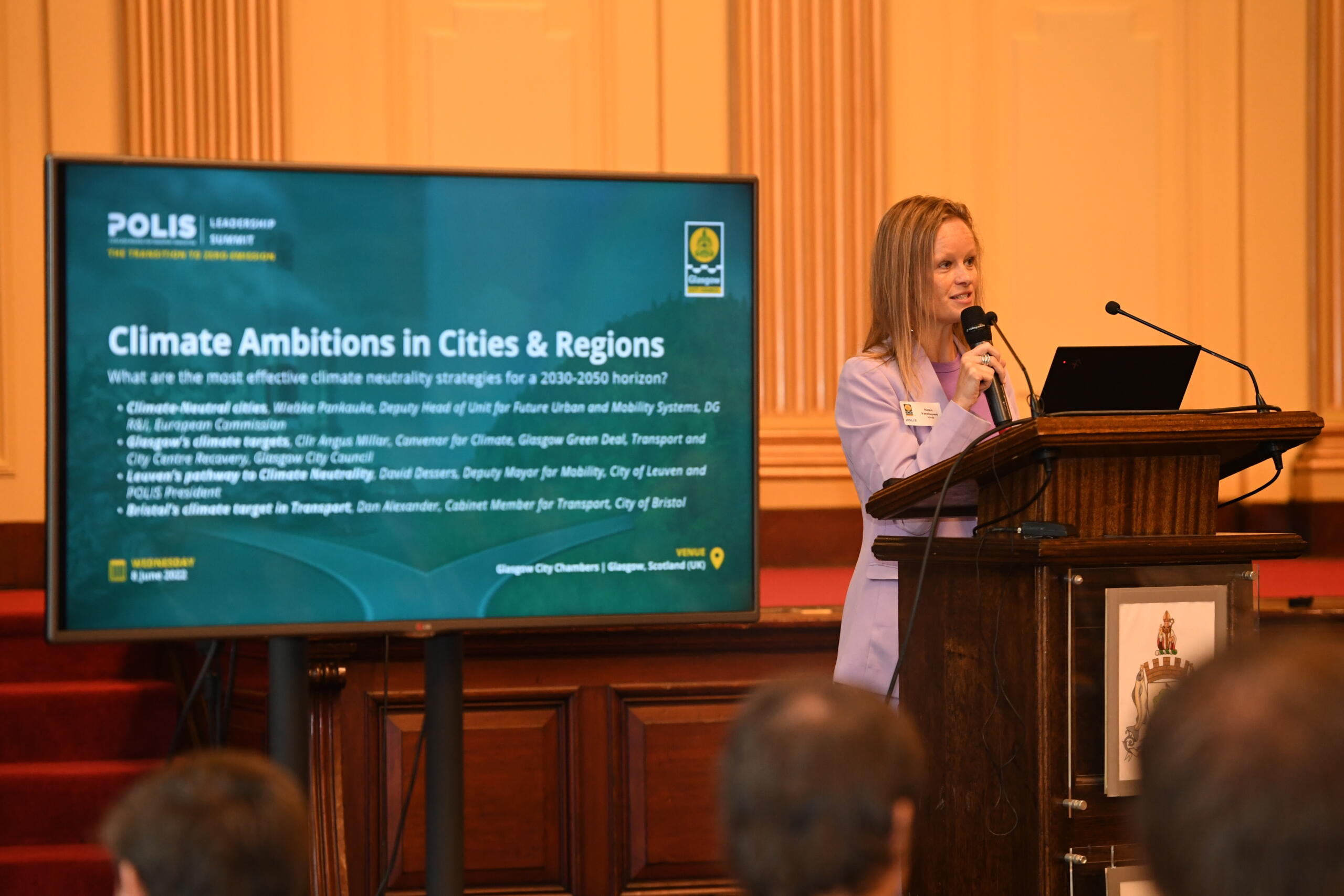
Karen Vancluysen opens POLIS' leadership summit in Glasgow; Photo Credit: GCC
Approaching COP27, POLIS puts pen to paper
COP27 is just one week away. National and international decision-makers will assemble to determine the trajectory of our climate action, and the world waits with bated breath to see if our aspirations will be met. Ahead of the conference, POLIS has penned an open letter to the COP, calling for leaders to take decisive and concrete action at this year’s summit, while listening to the voices of cities and regions.
The prominence given to cutting transport emissions at COP26 demonstrated governments’ recognition of the significance of mobility in our climate transition. Now, one year on, we must go further.
Building on POLIS’ Leadership Summit in Glasgow earlier this year, we call for greater multi-level collaboration, without which, carbon neutrality goals remain a pipedream.
The importance of local voices
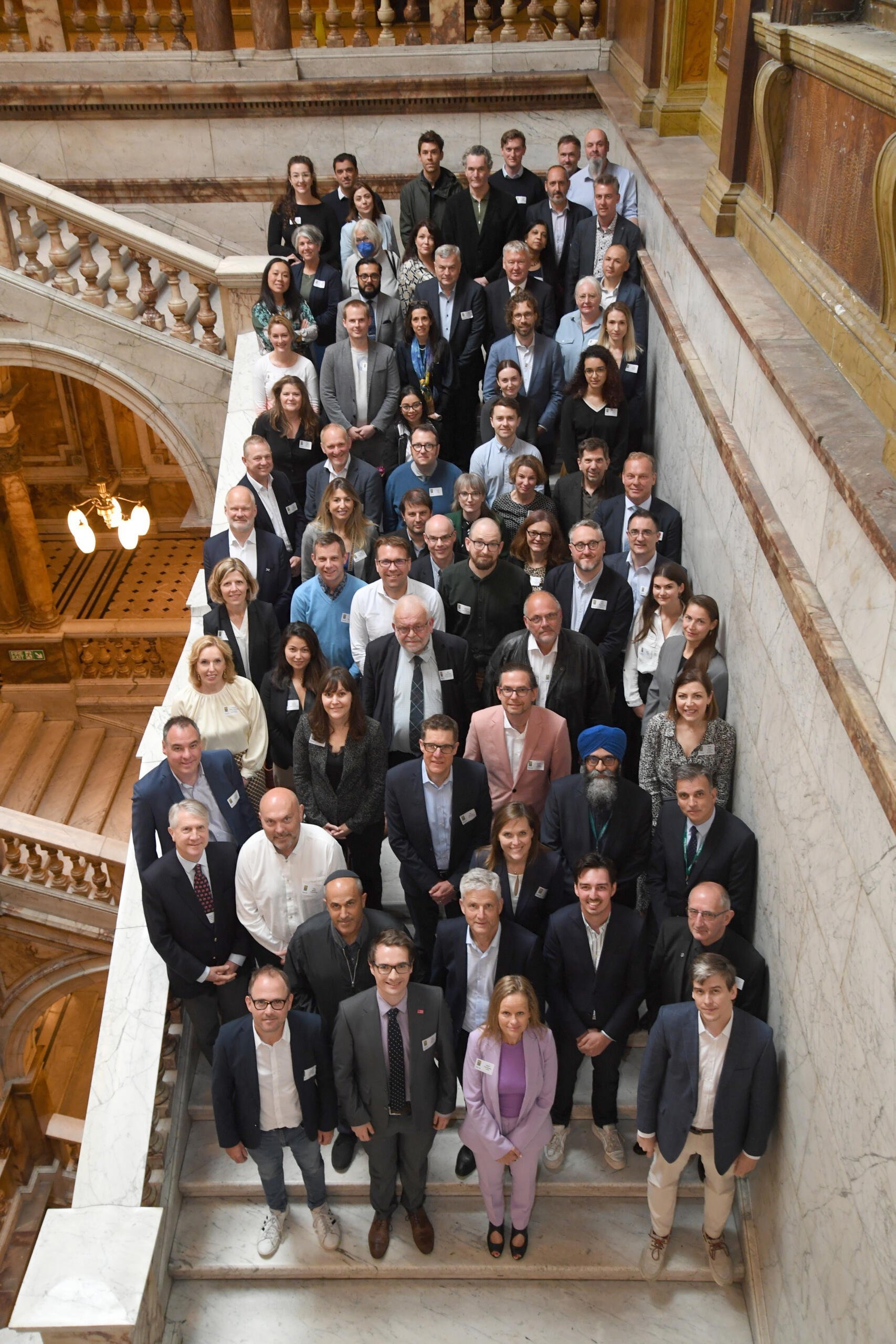
POLIS convenes transport leaders in Glasgow to discuss the future of sustainable urban mobility, Photo Credit: GCC
The COP27 is a fundamental moment to highlight the importance of accelerating the shift to sustainable urban mobility, acknowledging the key role of local and regional governments, and addressing their needs and supporting their work.
At present, national and international politicians lead the COP discussions; yet POLIS firmly believes local and regional governments must also have a seat at the table.
Cities are where we will win or lose the battle against climate change. Today, 55% of the world’s population lives in urban areas, a proportion expected to increase to 68% by 2050.
With urban passenger transport already accounting for nearly a third of transport emissions, our cities need to be ready.
POLIS’ Leadership Summit in Glasgow proved they are. From Bristol to Madrid, Leuven to London — leading politicians, practitioners, researchers, advocates and entrepreneurs from across the transport sector in Europe discussed sustainable, safe, innovative and inclusive transport.
The impetus for clear, comprehensive, and just action was palpable. With London’s low emissions zones, Gipuzkoa’s equitable public transit ticketing and Catalonia’s on-demand bus services, bold, audacious transformative changes are taking place to tackle our climate emergency.
POLIS and our members take action
Political commitment has driven brave steps forward. But we all know there is more work to do, and for that our cities need support, and they need to be listened to.
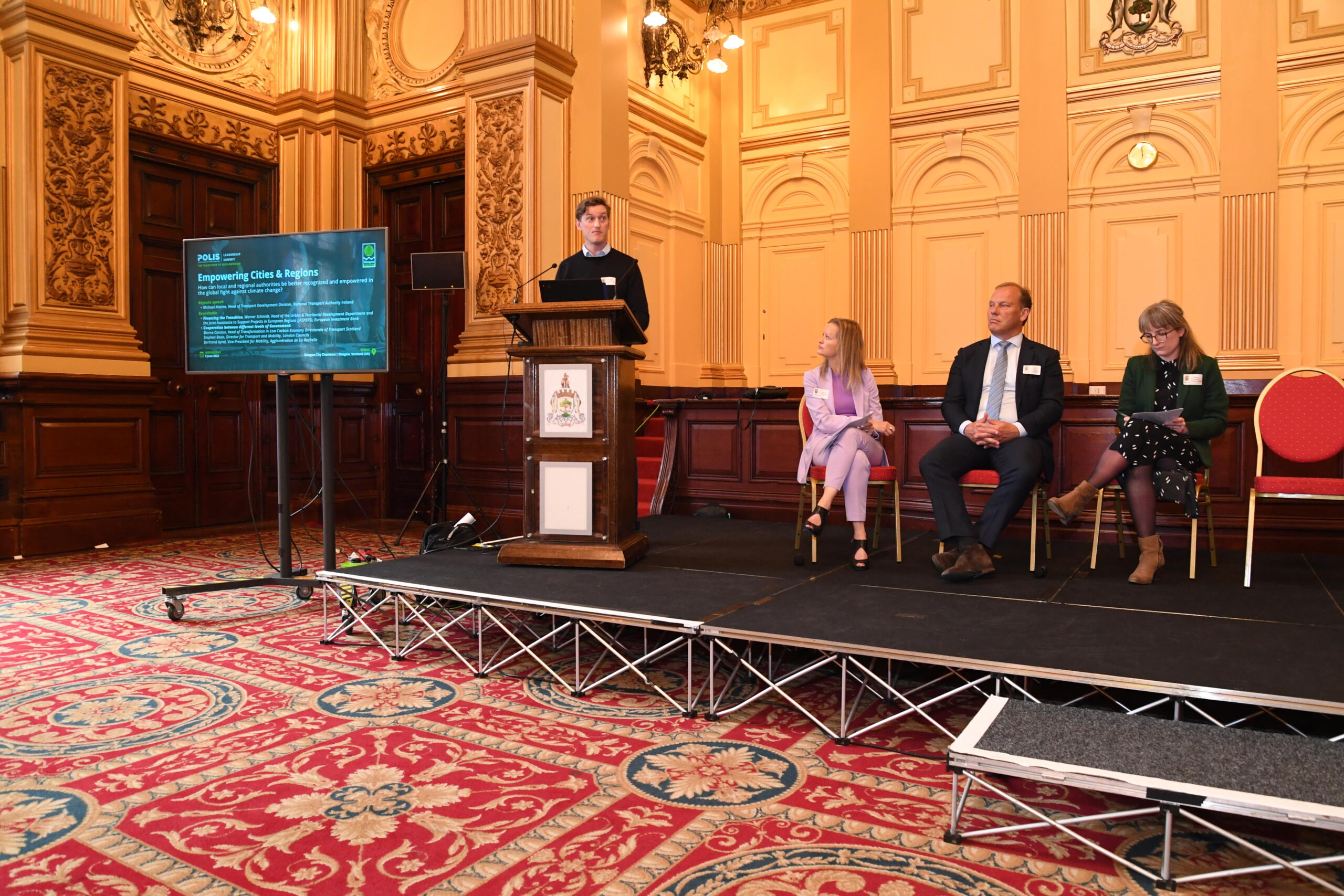
The panel discusses financing sustainable mobility and the solutions at hand. Photo Credit: GCC
POLIS’ letter outlines the pledges our members and associate members have taken in the fight against climate change; their commitment to planning for sustainable and safe mobility, their prioritisation of affordable, safe and sustainable modes of transport, collaboration through sharing and learning, and promotion of inclusive mobility for all.
At a time when international politics is increasingly polarised, POLIS members have continually demonstrated the capacity and commitment of local and regional governments to cooperate beyond national borders.
At the same time, targeted research and innovation are required to steer policies in a fair, efficient and effective way. The knowledge institutes, universities and others present at our Glasgow Leadership Summit revealed their insights into the technological and governance solutions demanded to tackle the climate crisis with the precision and speed we so desperately need.
Inclusion first
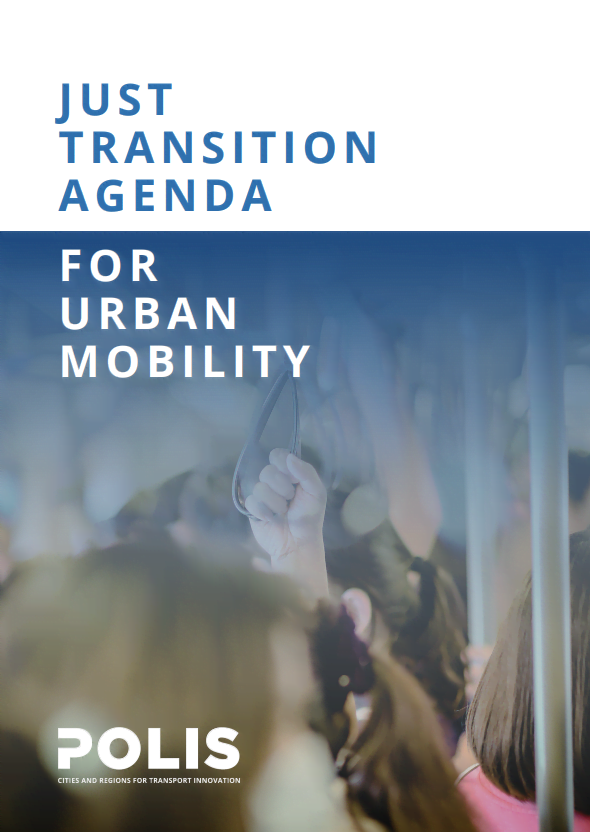
The Just Transition Agenda for urban mobility
COP27 is also a moment where fairness and justice must be prioritised. We must ensure a just transition, making urban mobility more affordable, safe, and inclusive.
POLIS’ letter outlines how physical access, gender, age and affordability cannot be ignored as we design the next generation of urban transit. The message builds on POLIS’ Just Transition Agenda, published at our Annual Conference last year, to urge decision-makers to make sure our climate strategies are fair for all.
Time to listen, act and move
Cities and regions have the ambition, understanding, and first-hand experience with rolling out cleaner transport strategies. POLIS members have stepped up to the plate — will COP be joining us too?
COP27 has the power to change our current course, therefore POLIS calls upon the parties to:
- Encourage the parties to assume commitments, at the global and national levels, to empower local and regional governments to accelerate the shift to sustainable urban mobility, through supportive and enabling national governance frameworks.
- Ensure the discussions approach transport decarbonisation in a way that prioritises modal shift before electrification, reflecting this in substantial investments in active travel and Public Transport.
- Unlock funding for locally and regionally designed and led measures to boost sustainable urban mobility, decarbonise transport, grow alternatives, and build infrastructure, to help cities reach climate neutrality.
- Integrate Sustainable Urban Mobility in the capacity building and skills development activities related to climate transition, to prepare professionals for the planning and implementation challenges to come.
- Recognise the need for integrated action at the ground level, helping cities and regions tackle multiple transport-related crises in one go, i.e. safety, air and noise pollution, congestion, quality of life and urban space.
You can read the full letter HERE, and in the documents attached.
